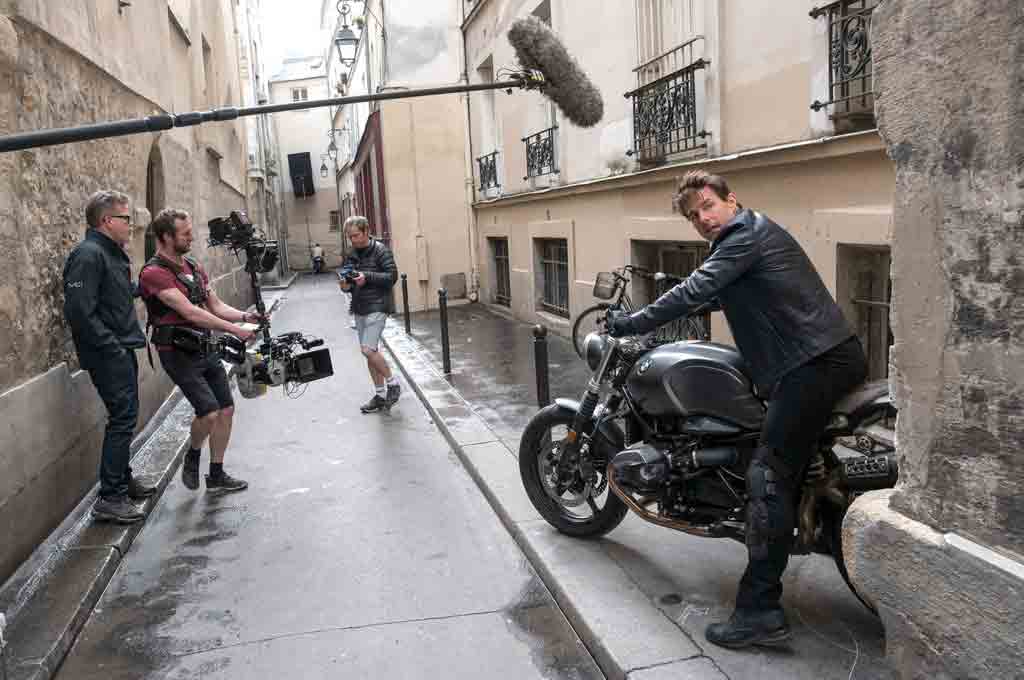Tom Cruise, who famously performs many of his own stunts, doubles down on the derring-do in Mission: Impossible — Fallout, the latest installment of the spy thriller franchise. Multi-award-winning British production sound mixer Chris Munro had to up his game to cleanly capture Cruise’s dialogue as the action star clambered aboard a moving helicopter, leaped from a high-altitude jet and sped through the streets of Paris, using Lectrosonics PDR Portable Digital Audio Recorders, as well as his existing arsenal of Lectrosonics Digital Hybrid Wireless equipment.
The best intentions often come back to haunt you. Mission: Impossible – Fallout finds Ethan Hunt (Tom Cruise) and his IMF team (Alec Baldwin, Simon Pegg, Ving Rhames) along with some familiar allies (Rebecca Ferguson, Michelle Monaghan) in a race against time after a mission gone wrong. Henry Cavill, Angela Bassett, and Vanessa Kirby also join the dynamic cast with filmmaker Christopher McQuarrie returning to the helm. Mission: Impossible – Fallout opened in RealD 3D and IMAX on July 27, 2018.
“I used Lectrosonics on M:I – Fallout because of the range that could be achieved during the challenging car chase and helicopter sequences,” said Munro, who relied on SMb transmitter belt packs for this production. For those situations where it was impractical to use wireless mics, including the skydiving sequences and some of the helicopter sequences, Munro used Lectrosonics’ PDR, a device the size of a small body pack that captures 24-bit, 48 kHz digital audio onto a Micro SD card with synchronized internal or jammed external timecode.
“We used the Lectrosonics PDR recorder quite a lot, mainly for the small size, but also for the timecode capability, as we were shooting very long takes on the helicopter sequences,” he said. “We also used a PDR to record all of the helicopter comms. This was particularly useful for the editor, as he could hear directions from the director, Christopher McQuarrie, which allowed him to identify which parts of the film were to be used.”
Munro, who typically uses DPA d:screet and Sanken Cos 11 lavalier microphone elements with his Lectrosonics transmitters, had to employ some different transducers for the helicopter and skydiving sequences, he said. “This involved the use of bone conduction technology, which not only allowed us to record Tom Cruise’s dialogue in the helicopter and during a HALO jump, but also allowed us to interface with the helicopter RF to allow him to safely fly the helicopter.”
HALO or High Altitude Low Opening is a military technique that minimizes the time a parachutist spends in the air, free-falling at terminal velocity for a period before opening the parachute as low as 2,000 feet above the ground. For the film, Cruise jumped from a Boeing C-17 transport jet flying at 25,000 feet.
“The bone conduction units that I used were specifically designed for military use,” Munro said. “I used them with the Lectrosonics PDRs, connected to the helicopter avionics using interfaces that were designed and built by our technical engineer, Jim McBride.”
Munro got his start in production sound in the early seventies and has been using Lectrosonics since his first film project in the U.S. He didn’t own any Lectrosonics equipment until the mid-nineties, when the company introduced versions that operated in Europe’s radio frequency spectrum.
Munro said, “I typically use six channels of radio mics, though of course it could be more,” although he uses booms mics whenever possible for their superior fidelity. “That is not to say that I don’t appreciate radios,” he said, “but that I value them as tools that contribute to getting the best sound possible.”
Mission: Impossible — Fallout was filmed at locations around the world. Despite the density of RF traffic at some of the locations, Munro and his team had no major problems, he said. “We were very fortunate in New Zealand as frequencies were not an issue. Paris and London were a little trickier, but my crew and I always take time to make a good frequency plan.”
Munro has worked on more than 80 films, winning Oscars for Gravity (2013), for which he also won a BAFTA, and Black Hawk Down (2001). He has also been recognized with multiple awards and nominations for his work on Wonder Woman (2017), Captain Phillips (2013), Quantum of Solace (2008), Casino Royale (2006), United 93 (2006) and numerous other films.
